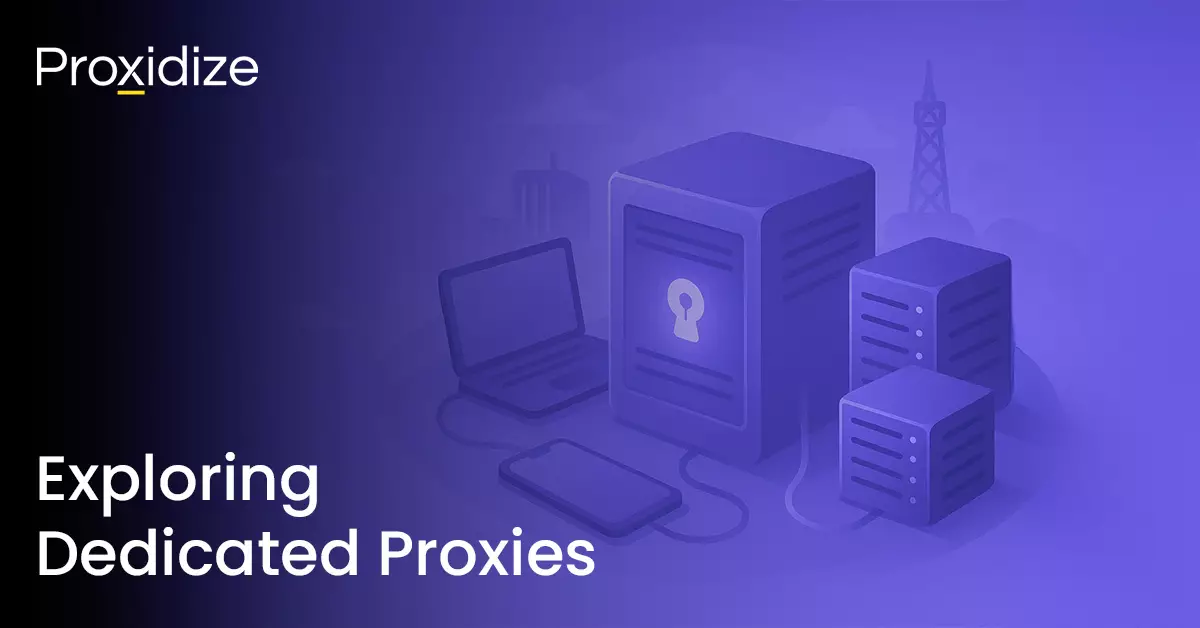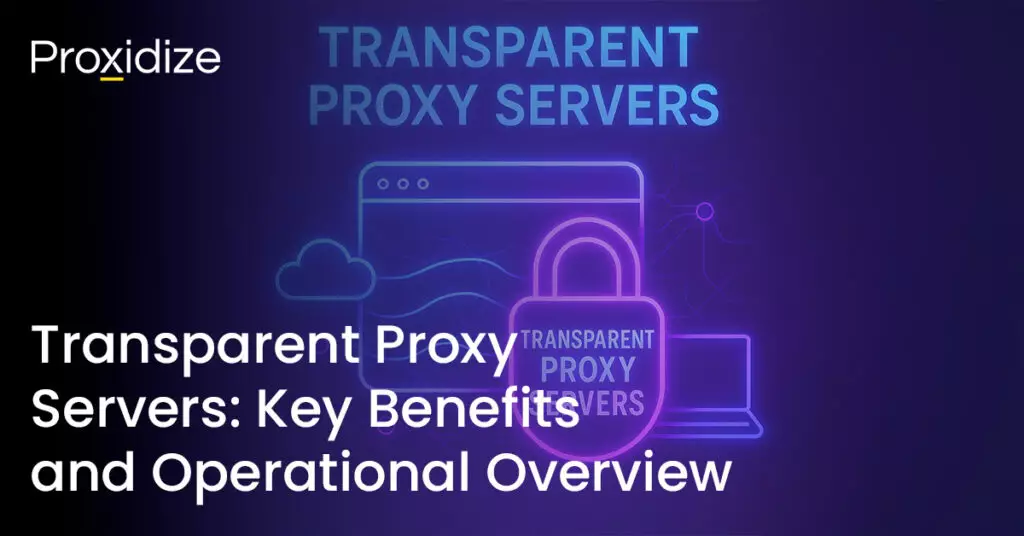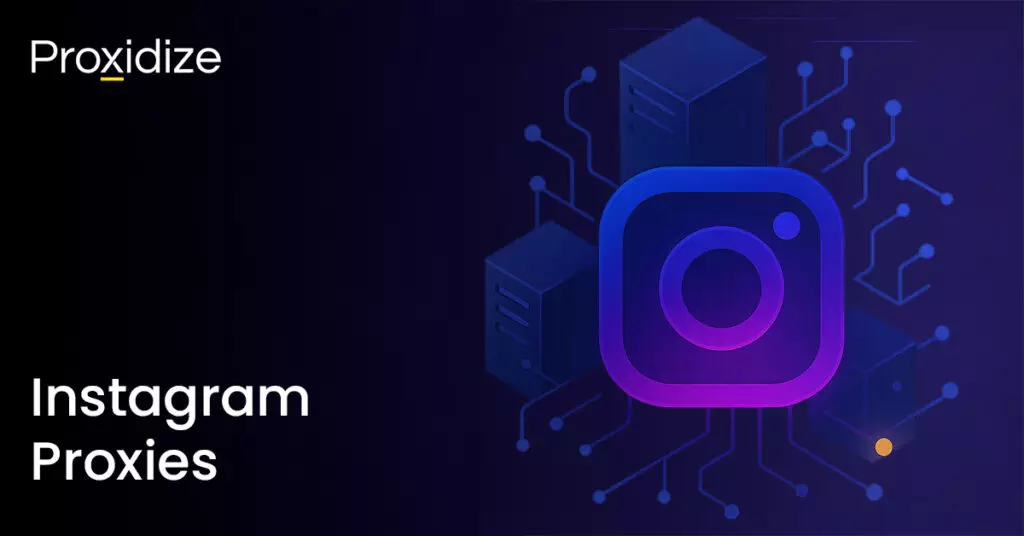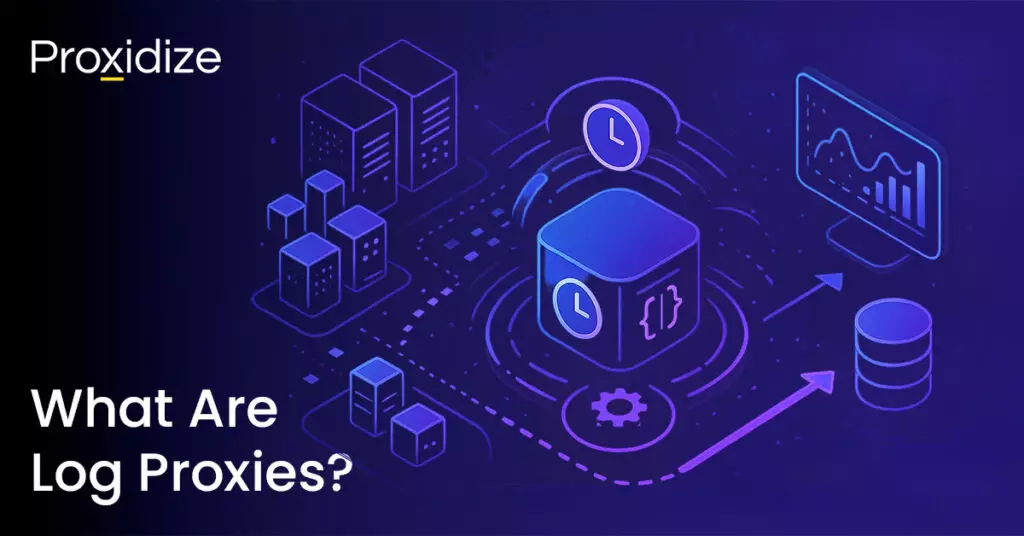What Is a Dedicated Proxy?
A dedicated proxy is a proxy server that’s reserved for just you — nobody else has access to it while it’s yours. It’s your IP address or set of dedicated IP addresses to use, which translates into bandwidth bottlenecks and blacklisted IPs.
Dedicated proxies most commonly source their IP from datacenter proxies or residential proxy services, which you’ll see them sold as dedicated datacenter proxies or private datacenter proxies. This is because it’s generally cheaper to source for a proxy provider.
A dedicated mobile proxy sources its IP from mobile carriers and is nearly indistinguishable from a real user. Sourcing a mobile IP requires a SIM card and greater overhead which is why most proxy providers lease them at a premium.
In this article we’ll discuss where dedicated proxies fit in the proxy ecosystem, why people use them and what for, and explore some of their pros and cons.
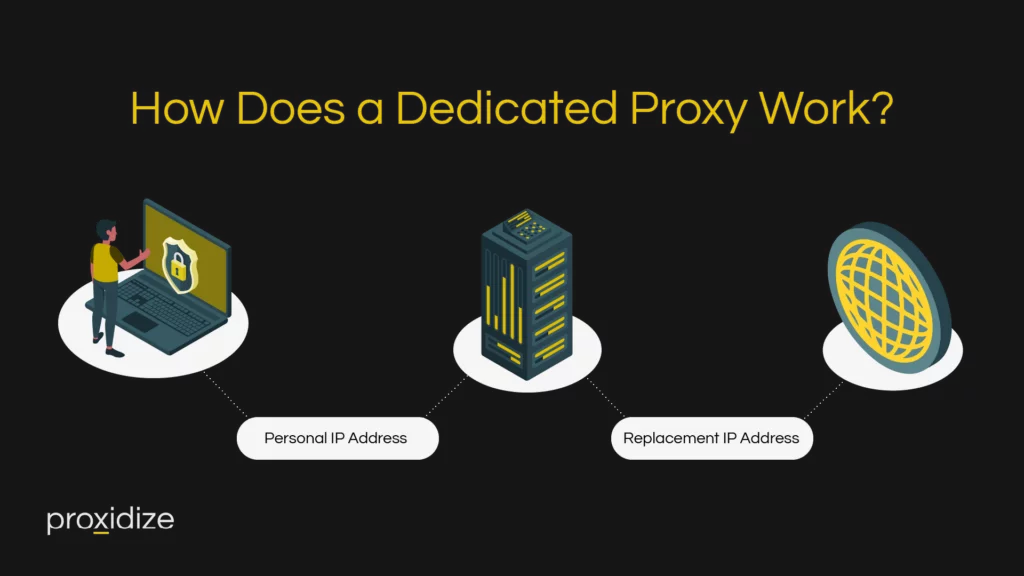
How Do Dedicated Proxies Work?
A dedicated proxy is a proxy server you have exclusive access to. It intercepts your outgoing traffic and forwards it to target servers on your behalf. Afterwards, it sends to your device the responses it has received. This conceals your real IP address and instead replaces it with the dedicated IP address of the proxy server.
Proxies can be configured to only be used by a specific app or browser extension, by your device as a whole, and more. Every request you send — whether it’s accessing a website in the United States, running social media management tools, or streaming content — goes through your dedicated proxy. On the receiving end, all sites see is that proxy’s IP, not yours.
Responses come back through the dedicated proxy before reaching you. Because the IP is yours alone, you don’t get the random slowdowns and slower speeds that shared users might face; there’s nobody sharing your resources.
Some dedicated proxy services offer IP rotation (helpful if you need fresh IPs). Even though the proxy is still exclusive to you, you can rotate among several dedicated IP addresses in your proxy pool. Depending on your use case, you might prefer to use a single static IP address for tasks like logging into accounts or preserving browser cookies intact.
Because you’re the only proxy user, your bandwidth isn’t divided among multiple users, only multiple projects, which you have full control over. This typically results in faster connection speeds and less risk of hitting bandwidth limitations. Plus, fewer connection drops mean more reliable performance for your online activity — be it web scraping, social media management, or bypassing geo-restricted content.
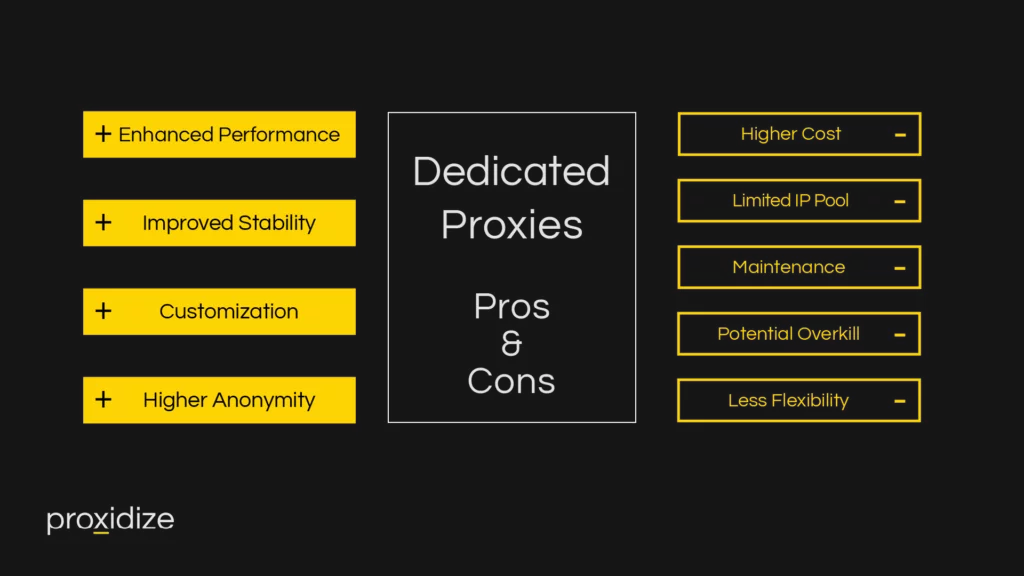
What Are the Pros and Cons of Dedicated Proxies?
Advantages of Dedicated Proxies
Higher Level of Privacy: You’re the only one using this proxy IP address. No neighbors to mess things up, no chance of inheriting an IP with a track record of illegal activities or bot traffic.
Faster Speeds & Better Performance: A dedicated proxy often means complete control of the proxy resources. That’s where you’ll see faster speeds and minimal downtime—especially handy if you’re scraping a large volume of internet traffic or dealing with challenging resources.
Consistent Identity: Need a static IP address for an account that gets touchy about changing IPs? Dedicated IP addresses solve that. You stay under the radar of anti-fraud filters that monitor for IP switching.
Fewer Blocks & Rate Limits: Websites are less likely to see repeated suspicious hits from a single IP that’s also being used by hundreds of other users. Because you’re a single user, you minimize the risk of random bans or CAPTCHAs triggered by someone else’s suspicious activity.
Absolute Control & Customization: If you want to configure proxy protocols like SOCKS5 protocols, fine-tune connection speeds, or implement advanced features such as sticky sessions or Unlimited-duration sessions, you can do it all without juggling other users’ needs.
Disadvantages of Dedicated Proxies
Higher Price: You’re paying for exclusivity, so dedicated proxy plans typically cost more than public proxies or semi-dedicated options. Though many providers offer an affordable option or basic option, prices can still run steep.
Fewer IPs in a Single Subscription:
Because you’re buying exclusive use of each IP, you might not get a wide range of addresses to rotate through unless you’re shelling out for a more expensive plan. This can be an issue for large-scale web automation that needs an enormous IP pool.
Requires More Know-How: If you’re dealing with advanced proxy management, issues with email deliverability, or custom proxy settings, you might need some extra expertise to get it all running smoothly. Integrations with 3rd parties or specialized API for proxies can be a bit more involved.
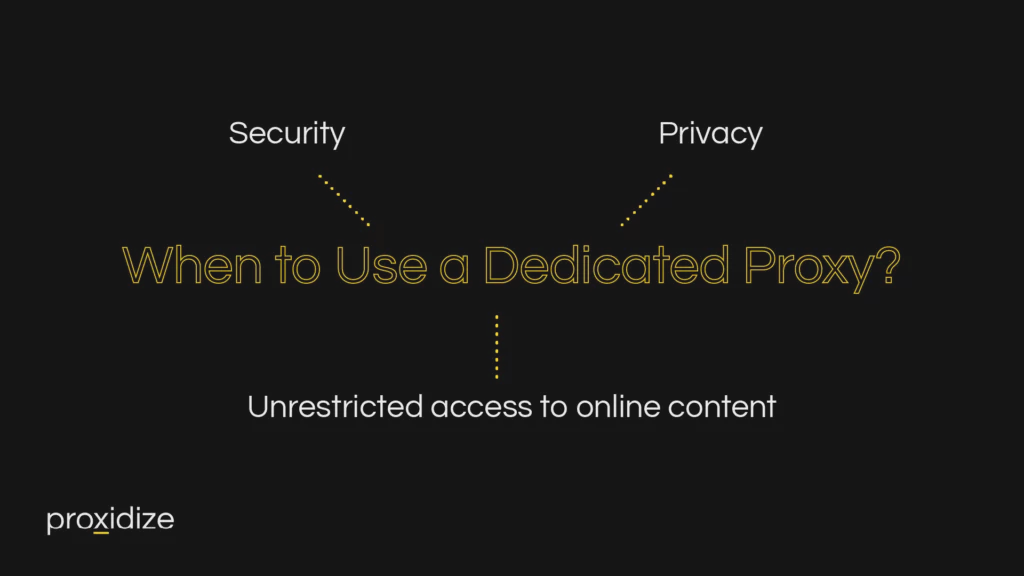
When Should You Use a Dedicated Proxy?
High-Volume Scraping & Automation
If you’re pulling massive datasets for market analysis or business intelligence, you don’t want random speed dips, nor do you want bad neighbors to have affected the reputation of the IP you’re using. A dedicated proxy often has unlimited bandwidth or unlimited traffic (depending on your proxy service provider), which is perfect for data-intensive tasks like block-free scraping.
Geo-Restricted Access
If you need consistent, stable connections for streaming or data collection from a region like the United Kingdom, Brazil, United States, and beyond, a dedicated proxy in your choice country ensures a reliable selection of locations. This can be especially important if you must maintain a steady identity or keep your browser cookies intact.
Serious Social Media Management
For businesses handling multiple social media accounts, dealing with brand outreach, or conducting consumer behavior analysis, compartmentalizing their accounts between different IPs can make all the difference. A single unfortunate IP ban can be disruptive to operations — a dedicated IP address exposes you to less risk.
Enterprise-Level Guarantees & Stability
Big companies often require rock-solid redundancies and consistent performance. Dedicated proxies offer the most consistent results short of building one’s own proxy network.
Dedicated Proxy Alternatives
Shared Proxies: Cheap but definitely more prone to bandwidth throttling, security issues, and IP bans. Perfect if you’re on a budget or doing low-intensity tasks. Not so great if you need bulletproof reliability.
Semi-Dedicated Proxies: A few users share one proxy. You won’t pay as much as for a dedicated proxy server, but you also won’t get complete IP control. Speeds and quality might be somewhat better than fully shared, but still not as solid as a purely dedicated environment.
Conclusion
Dedicated proxies are proxies at their best: They offer faster speeds, complete control, and minimal chance of being slapped with an IP ban because another user scraped too close to the sun. Of course, the exclusivity of dedicated proxies comes at a cost, but for many power users — big businesses, advanced scrapers, or dedicated marketing teams — it’s a worthwhile investment.
If you can manage the higher price and potentially steeper setup, dedicated proxies are often a go-to choice for everything from social media management to market analysis. They’re the top-tier proxy choice for serious tasks where reliability and privacy can’t be compromised. Meanwhile, if you’re only looking for quick, cost-effective coverage, you might start with public proxies or semi-dedicated ones and upgrade when you’re ready.
In short, dedicated proxies are a reliable proxy option for those who need absolute control and top-tier privacy. Their slightly higher cost is often offset by stable connection speeds, fewer blocks, and minimal security risk — perfect for intensive proxy usage.
Frequently Asked Questions
Do Dedicated Proxies Offer a Money-Back Option?
Some proxy service providers and premium provider plans include a 14-day refund or 3-day refund window. Always check individual proxy plans for details on trials and card-based payment methods like Apple Pay.
Can I Use Dedicated Proxies for Unlimited-Duration Sessions and High Volumes of Traffic?
Absolutely. Many dedicated proxy solutions support unlimited-duration sessions and allow unlimited traffic usage. Just confirm with your provider if bandwidth usage or bandwidth limits apply.
What About IPv6 IPs or Datacenter IPs?
Some providers offer IPv6 IPs and Datacenter IPs for their dedicated servers. If you need dedicated datacenter IP, confirm your plan’s limitations for speed and whether you can integrate them with advanced targeting options or 3rd party integrations.
Are Dedicated Proxies Good for Email Protection or Issues with Email Deliverability?
A dedicated proxy can help keep your sending IP separate from potential bad neighbors. This isolates your email traffic, reducing the chance it’ll be blacklisted for someone else’s suspicious activity.
Do Dedicated Proxies Work for Geo-Restricted Content?
Yes. Many proxy providers have IPs in the United Kingdom, IPs in Australia, or IPs in China, and beyond. Grabbing a choice country ensures consistent access and stable performance for streaming and site scraping in that region.
Can a Dedicated Proxy Handle Payment Methods Like Apple Pay?
In most cases, yes. As long as Apple Pay is supported in the proxy’s region, you can use a dedicated IP address without triggering alerts. Secure and consistent connections help keep your credit card or consumer behavior data safer.
Do I Need to Worry About Security Issues?
A dedicated proxy can enhance online security by isolating your traffic and providing safe connections. Look for providers that support access through security policies or advanced security features, ensuring reliable internet connection for your tasks.
Is Bandwidth Throttling an Issue on Dedicated Proxies?
Not typically. Many offer unlimited bandwidth or large bandwidth connections. Just double-check the fine print for any hidden traffic limit or bandwidth throttling conditions.
How Do I Combine Dedicated Proxies with Other Tools?
If you’re using legitimate automation tools, check whether your provider supports an API for proxies or custom solutions. Make sure to avoid suspicious activity that might violate the proxy’s terms.
What If I Need a Test Period or a 60-Minute Test Proxy?
Some providers give short testing windows or a 60-minute test proxy so you can monitor average response time before committing. It’s always wise to check reviews or forums for real user experiences with that proxy provider.
